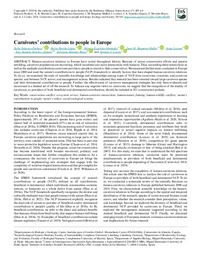Por favor, use este identificador para citar o enlazar este ítem:
https://hdl.handle.net/11000/33953Registro completo de metadatos
| Campo DC | Valor | Lengua/Idioma |
|---|---|---|
| dc.contributor.author | Palacios Pacheco, Sofía | - |
| dc.contributor.author | Martín López, Berta | - |
| dc.contributor.author | Expósito-Granados, Mónica | - |
| dc.contributor.author | Requena-Mullor, Juan Miguel | - |
| dc.contributor.author | Lozano, Jorge | - |
| dc.contributor.author | Sánchez Zapata, José Antonio | - |
| dc.contributor.author | Morales-Reyes, Zebensui | - |
| dc.contributor.author | Castro, Antonio J. | - |
| dc.contributor.other | Departamentos de la UMH::Biología Aplicada | es_ES |
| dc.date.accessioned | 2024-11-20T11:14:34Z | - |
| dc.date.available | 2024-11-20T11:14:34Z | - |
| dc.date.created | 2024 | - |
| dc.identifier.citation | Ecology & Society, Volume 29, Issue 3, 2024 | es_ES |
| dc.identifier.issn | 1708-3087 | - |
| dc.identifier.uri | https://hdl.handle.net/11000/33953 | - |
| dc.description.abstract | Human-carnivore relations in Europe have varied throughout history. Because of recent conservation efforts and passive rewilding, carnivore populations are recovering, which translates into more interactions with humans. Thus, unraveling these interactions as well as the multiple contributions carnivores provide to people is crucial to their conservation. We examined the literature conducted in Europe since 2000 and used the nature’s contributions to people (NCP) framework to identify factors that have shaped human-carnivore relations. To do so, we examined the state of scientific knowledge and relationships among types of NCP from carnivores, countries, and carnivore species; and between NCP, actors, and management actions. Results indicated that research has been oriented toward large carnivore species and their detrimental contributions to people. Further, the effectiveness of carnivore management strategies has only been evaluated and monitored in a limited set of all the research. To balance any negative views on carnivores, we suggest that the recognition of the duality of carnivores, as providers of both beneficial and detrimental contributions, should be included in EU conservation policies. | es_ES |
| dc.format | application/pdf | es_ES |
| dc.format.extent | 12 | es_ES |
| dc.language.iso | eng | es_ES |
| dc.publisher | Resilience Alliance | es_ES |
| dc.rights | info:eu-repo/semantics/openAccess | es_ES |
| dc.rights.uri | http://creativecommons.org/licenses/by-nc-nd/4.0/ | * |
| dc.subject | conservation conflict | es_ES |
| dc.subject | ecosystem service | es_ES |
| dc.subject | human-carnivore interactions | es_ES |
| dc.subject | human-nature framing | es_ES |
| dc.subject | human-wildlife conflicts | es_ES |
| dc.subject.other | CDU::5 - Ciencias puras y naturales::57 - Biología | es_ES |
| dc.title | Carnivores’ contributions to people in Europe | es_ES |
| dc.type | info:eu-repo/semantics/article | es_ES |
| dc.relation.publisherversion | https://doi.org/10.5751/ES-15249-290309 | es_ES |

Ver/Abrir:
43.pdf
3,13 MB
Adobe PDF
Compartir:
 La licencia se describe como: Atribución-NonComercial-NoDerivada 4.0 Internacional.
La licencia se describe como: Atribución-NonComercial-NoDerivada 4.0 Internacional.
.png)